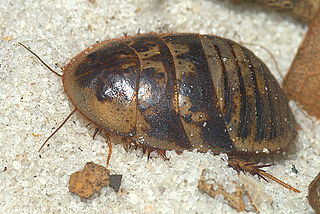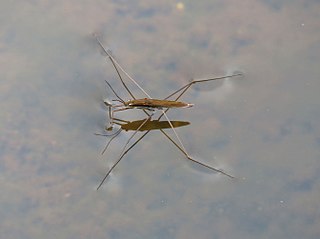
Ectobiidae is a family of the order Blattodea (cockroaches). This family contains many of the smaller common household pest cockroaches, among others. They are sometimes called wood cockroaches. A few notable species include:

Corydiidae, previously known as Polyphagidae, is a family of the order Blattodea (cockroaches). Many are known as sand cockroaches. The family is divided into five subfamilies, comprising some 40 genera. One prominent species is the desert cockroach, Arenivaga investigata.

Cockroaches are insects of the order Blattodea, which also includes termites. About 30 cockroach species out of 4,600 are associated with human habitats. Some species are well-known as pests.
The Arenivaga investigata, also known as the desert cockroach, is a member of the cockroach family Corydiidae.

Arenivaga is a genus of sand cockroaches, of the subfamily Corydiinae, in the family Corydiidae. These cockroaches live in sandy soils and dunes in the southwestern United States, Florida and Mexico. Arenivaga comes from the Latin arena meaning sand and vagus meaning wandering.

Arenivaga floridensis is a species of sand cockroaches of the subfamily Corydiinae, in the family Corydiidae. It is a fossorial insect endemic to the Florida sand ridge. Its natural habitats are scrubland and sandhill communities on ancient ridges in peninsular Florida.
Depopulation of cockroaches in post-Soviet states refers observations that there has been a quick disappearance of various types of cockroaches since the beginning of the 21st century in Russia and other countries of the former USSR. Various factors have been suggested as causes of the depopulation.
Arenivaga bolliana, known generally as the Boll's sand cockroach or Boll's sandroach, is a species of cockroach in the family Corydiidae. It is found in North America.
Arenivaga apacha, the Apache sand cockroach, is a species of cockroach in the family Corydiidae. It is found in North America.
Gammarotettix genitalis is a species of camel cricket in the family Rhaphidophoridae. It is found in North America.
Gammarotettix is a genus of camel crickets in the family Rhaphidophoridae. There are about six described species in Gammarotettix.
Arenivaga erratica, the erratic sand cockroach, is a species of cockroach in the family Corydiidae. It is found in Central America and North America.
Eremoblatta subdiaphana, the hairy desert cockroach, is a species of cockroach in the family Corydiidae. It is found in North America.

Limnoporus is a genus of water striders in the family Gerridae. There are about eight described species in Limnoporus.
Latiblattella is a genus of cockroach in the family Ectobiidae. There are about 18 described species in Latiblattella.
Arenivaga tonkawa, the tonkawa sand cockroach, is a species of cockroach in the family Corydiidae. It is found in Central America and North America.
Cryptocercus punctulatus, known generally as brown-hooded cockroach, is a species of cockroach in the family Cryptocercidae. Other common names include the woodroach, wingless wood roach, and eastern wood-eating cockroach. It is found in North America.
Plectoptera poeyi, known generally as the Florida beetle roach or Florida beetle cockroach, is a species of cockroach in the family Ectobiidae. It is found in the Caribbean Sea, North America, and the Caribbean.
Latiblattella lucifrons, the pale headed cockroach, is a species of cockroach in the family Ectobiidae. It is found in Central America and North America.




